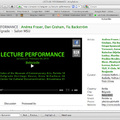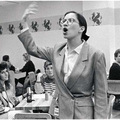Table Society is an experiment. It gathers a heterogeneous company of thirteen, tightly or loosely co-operating members of various creative and brainstorming groups. The Society’s main aim is to discuss particular topics from multiple aspects. In a wider context, their table stands for a forum for public discourse; while at the Műcsarnok/Kunsthalle, it also serves as everyone’s discussion table. Visitors to the exhibition may be equal partners to the community of creators at this forum
asztaltársaság / table society from leonor botev on Vimeo.
The exhibition at Műcsarnok
Table Society / Asztaltársaság
Table Society is an experiment. It is a diverse group of twelve, participants are loosely or tightly cooperating in various groups of artists and thinkers. Communication between people of fundamentally different views and professions can lead to exciting results and an experience can’t be replaced by anything else. The company’s fundamental value lies in its diversity: different socialization and social background, professions the participants’ represent, the special language of arts and sciences fundamentally determine people’s thinking, views and the way they communicate. These characteristics appear clearly when meeting with each other: it gives us a kind of mapping of society within relatively closed, determined space and time.
The project is based on two essential revelations. We all feel that our professions are creating closed, inward-looking groups with limited self-reflexivity of many negative social impacts. Meanwhile we experince that many of us have a strong desire for an interdisciplinary community. Our purpose is to create space and situation which provides frame for communication for Table Society, and other participants as well. In a broader sense, the Table placed in Műcsarnok is a space for public discussions, as the exhibition’s visitors can take advantage of the situation provided by the Table, just as the members.
The essence of the project is that we put the space of Műcsarnok in practice and call anyone else to do so. The exhibition generates occasional cooperations and creates opportunities to introduce participants’ working methods and creative processes. We try to address the problem of lack of space for creative urban communities. There are only a few places to meet, present and work; way too much is going on at pubs’ tables. Meanwhile, large public spaces stay unused or badly utilized. Műcsarnok represents this contrast as a highly representative, huge space, disproportionately little used by only a few people, while art is crowded out on walls of pubs searching for the way to the audience, which is easier to find there than in spaces originally dedicated to this purpose.
The project started in January 2011: by creating its key symbol, the Table, the Company has been founded. Members sat down weekly for a moderated two-hour discussion. Each topic was prepared by two, who then decided on how to setup and lead the conversation by taking the moderator’s role. The use of the Table became more intensive and open during the exhibition: we tried to bring the estabilished discourse to the museum’s space, an online surface encouraged participation in the discussions and programs for other exhibitors and visitors too. The Table could be booked online for any kind of use within opening hours. The documentation - picture and sound collage - of talks and happenings around the Table was presented in the exhibition room too.
Thanks to the exhibition, demand for establishing a Table Society came forward, but exists independently. That’s why some participants think that the process itself is more important than the exhibited results, Table Society can grow into a permanent social community and after operating in Műcsarnok it will live on in other places and forms.
Barta Márton - Édes Balázs - Finta Sándor - Matécsa Márti - Kreet Paljas - Peer Krisztián - Pohl Zsuzsi - Sebő Ferenc - Soltész Noémi - Turcsány Villő - Varga Magdolna - Zemplén Gábor




